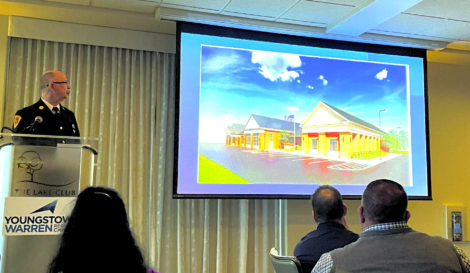Judge touts drug court’s success
YOUNGSTOWN — Mahoning County Common Pleas Court Judge John Durkin said he remembers standing before Mahoning County commissioners 28 years ago to ask for their help to start a drug court.
At the time, it was only the second such program in the state (the first one was statutorily created in Hamilton County), but on Thursday, Durkin told the board that his drug court has since graduated more than 1,600 people.
“Today, there are over 165 drug courts in our state,” Durkin said. “Yesterday the (Ohio) Supreme Court came up to recertify our docket, and it was indicated after our site visit that she would in fact approve us for recertification to continue for another two years.”
On the board’s agenda Thursday was a resolution to allocate $75,000 from money the county receives from the OneOhio Foundation, which manages Ohio’s share of the multi-billion-dollar federal settlement with pharmaceutical companies over the opiate epidemic.
Commissioners also allocated $35,000 of that money to the Mahoning County Mental Health and Recovery Board.
“We’re using our $35,000 for prevention education,” said MHRB Executive Director Duane Piccirilli.
Piccirilli, who is Region 7’s (Mahoning and Trumbull counties) representative to sit on the state OneOhio Foundation board, said the commissioners work with his office to ensure that the money they allocate goes along with the OneOhio abatement strategies and then has the Mahoning County Prosecutor’s Office review the resolution as well.
Durkin said his program usually has anywhere from 35 to 50 people enrolled at a time, and hosts two to four graduation ceremonies a year. Just last week, he said, three people graduated from the program.
Most everyone who enters it is facing felony charges.
“They’re all looking at felonies, a majority are facing prison sentences, and we know jail and prison is not going to solve a substance-use disorder,” he said.
But those challenging defendants are exactly the ones who often need it most.
“There’s a lot of evidence-based research that indicates that for programs like drug courts, the most ideal candidate is someone who is high-risk and high-need,” he said. “That simply means they have a severe substance abuse disorder and they have had failed attempts at probation in the past.”
Durkin said when the program began, it received federal funding and so he was limited on who he could enroll.
“Since we no longer receive federal funds, we can expand the pool,” he said. “We’ve taken cases where someone might be charged with burglary — as long as we have the approval of the victims — knowing that substance use disorder fuels the offenses and the criminal behavior.”
Over its 28 years, Durkin said the program has only a 9% recidivism rate.
He said that is because it is not just about getting participants over their addictions.
“For so many of them, they’ve suffered some type of trauma, so we address the substance use disorder, but we also address any trauma they have through counseling and treatment, and that has proved incredibly beneficial,” he said. “The other tremendous partner we have now is the Opportunities for Ohioans with Disabilities (OOD). They are a part of our team, and they provide services like resume writing, helping them find employment, teaching interviewing skills, and because substance use is a recognized disability, they’ve been able to be a part of our team.”
Commissioners praised Durkin and the success of the program.
“I have heard stories of people there that I may have seen in the past … and I look and I think, ‘my God, all they need is a hand, and you did it,” Commissioner Carol Rimedio-Righetti said to Durkin.
“Judge, it’s probably the most successful court docket in the state, maybe the country, what you’ve done over 28 years,” Commissioner Anthony Traficanti said. “You’ve given these folks a chance to live again, to earn again, to come back into society. Thank you to you and your court and your staff, for giving us this opportunity in our community to help out people.”
Traficanti said he would like to see more money go from the settlement to Durkin’s court and similar programs, statewide and nationally.
Commissioner Geno DiFabio said it’s hard to find a silver lining around the cloud that was — and remains — the opioid epidemic, but the OneOhio funding and programs like Durkin’s drug court offer some hope.
“The scourge that was that time ruined so many lives and everything else, and the only benefit from that is being able to help where we can help — the Mental Health and Recovery Board and we’ve helped your court,” he said. “So there’s no silver lining, but at least it’s a way to fix some of the wrongs caused by that scourge.”


